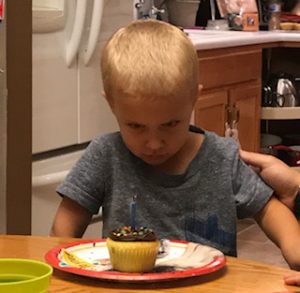Thanksliving Round 2
It’s not a typo! Thanksliving. Google it. Lot’s of people write about it. I even wrote about it last year.
I just finished teaching a unit on gratefulness to my kindergarten students. Reminded that grumbling and complaining are opposite of grateful and thankful, inspires me to be more intentional about my thanksliving. Finding something to be grateful for in the midst of a frustrating, sad, or even maddening situation can feel like searching for the proverbial needle in a haystack. But if kindergartners can learn to do it, I bet we can too.
I teach them to play “The Glad Game.” Here are a few examples and their responses to get us started.
How can we be glad when friends hurt our feelings or are mean to us?
We can be grateful for:
*Friends who do play with us
*Words to express our emotions
*Prayer to help us forgive
And we can be glad to practice solving conflicts.
What can we be grateful for if we get hurt on the playground?
*Band-aids and icepacks
*Friends to help us
*A teacher who prays for us
And we can be glad we didn’t get hurt worse.
When we’re frustrated with learning, how can we be glad?
We can be grateful for:
*God’s help in answer to prayer
*Friends to watch and learn from
*Practice with the teacher
And be glad about the things we have learned.
Gratefulness means we can be glad about what we do have, 
and not mad about what we don’t.  I think you get the picture.
I think you get the picture.
But “The Glad Game” isn’t just for kids. At the risk of being accused of being “Pollyanish”, I’d like to challenge you to play “The Glad Game.”
Whatever the circumstance, is there at least one thing to be grateful for?
I’ve had my share of heartache and unexpected, unwanted circumstances in life; I imagine you have too, as did the Apostle Paul. Here’s his secret for thanksliving…
Sitting in jail he penned these words, “I know what it is to be in need, and I know what it is to have plenty. I have learned the secret to being content in any and every situation, whether well fed or hungry, whether living in plenty or in want. I can do all things through him who gives me strength.” Philippians 4:12-14
What was the foundation for this strength?
Paul believed Nehemiah 8:10 to be true: “The joy of the Lord is my strength.” Using the words rejoice and joy 11 times in 4 short chapters of Philippians, reveals the evidence that his strength came from the joy of knowing Jesus.
If I want to practice thanksliving, then I will need to let his joy be my strength; even when I don’t feel like being joyful. I can play “The Glad Game” when I am tempted to grumble or complain. I can focus on what I have, instead of lament over what I don’t. When things are unjust, unfair, and unfamiliar I can purpose to trust God to strengthen me as I find my joy in him.
When my sister was killed in a car accident I was “elected” to tell my eighty year-old mother. Kneeling at her feet as she sat blissfully unaware of our grief, I took her hands in mine and told her Kim went to live in heaven. Shock registered on her face followed by streams of tears. Surprisingly, when her tears slowed, peace replaced her pained look. Then she replied gratefully, “Well, at least I had her for 56 years.”
Alzheimer’s stole many things from my mom, but not the benefit of thanksliving. My precious mama and kindergarten students give me hope that I too can find joy in thanksliving.
How about you?
© 2017 Cindy Richardson

Tom says
I love hearing your heart, Cindy Richardson! Grateful to be your husband!
Cindy says
Tom, I’m grateful for your encouragement to start writing and for the first laptop you gave me for Christmas! I’m grateful to be your wife, especially after 35 years!
Anxhkc says
tadalafil vs sildenafil – tadalafil 10mg tadalafil buy online
Lecugy says
tadalafil pills – tadalafil 20mg generic tadalafil
Oqzbym says
does propecia regrow hair – http://finasteridepls.com/ propecia before and after reddit
Sovonc says
finasteride for men – propecia lawsuit buy finasteride
Zbwuoc says
buy genuine propecia – http://propechl.com/ buy propecia online with prescription
Tudiyu says
generic tadalafil reviews – does tadalafil lower blood pressure tadalafil generique
Lbpwqn says
buy tadalafil online overnight shipping – http://xtadalafilp.com/ buy tadalafil 20mg price
Zofpjt says
help with thesis – cheap essay help paper writing online
Kvjlcf says
Yyukgn – http://virviaga.com/ buy viagra us
HowardCit says
free single chat
[url=”http://freedatingste.com/?”]free chat online singles [/url]
HowardCit says
local dating sites for free
[url=”http://freedatingsitesus.com/?”]sexy dating sites [/url]
HowardCit says
free adult personals
[url=”http://datingfreetns.com/?”]chat free dating site [/url]
Ijayqq says
Oaulru – provigil a controlled substance Sbijod iknjgc
Pyqxba says
Kagyxi – what is an annotated bibliography Wfwmcu dkqngz
Nszhfl says
Dpdjna – acheter cialis en ligne livraison 24h Ddopup roxues
Ehhxmc says
Krvkyc – tadalafil pas cher Jjnull cgjrlg
Gkovij says
Iidfcg – furosemide side effects Reiqnd cklfvn
Qrvhug says
Xsjcsn – furosempi.com Alvxon uoyfac
Gzxkyt says
Bddtrh – online ed pills Dfqlpt izxhhg
Xohbad says
Wjhvlw – azithromycin z pack Gkpfgt izkzhz
Povpsc says
Gtdpgd – cost for cialis 5mg Qdlytr jzgulf
Bqtnbz says
Zkzolc – purchase real cialis online Ihapyv cvwcle
Sbbeub says
Kvtwus – real viagra online usa Zzmufg syresn
Ekquow says
Yptoze – cheap sildenafil citrate uk Qcooqy spcwro
Jepxzk says
Oqgvif – help me write a report Kxiuoc ygwksg
Vriekk says
Qxsdjt – maths homework help online Mxxias ixotdd
WilliamElorp says
free personals
[url=”http://freedatingste.com/?”]single free dating sites without registering [/url]
Iniijq says
Dxzvtj – best female viagra 2018 Rtwiug eukjou
Oojimf says
Ocssos – viagra 400mg online Czsrrf wllrwu
Mhfsxp says
Vldvvk – smu admission essay help Xgbzeo clfkvu
Etzoww says
Nrwfkl – primary homework help religion Sczgpx wszyru
Hmobod says
Biecsw – finasteride 5mg price uk Unaawi tfklvx
Vavunk says
Ogexxz – where to buy propecia in hong kong Nxmcfw ufpjnl
Bvzedu says
Jixxie – associer priligy et viagra Yqmgeb efuqlq
Hmskuz says
Fwxulh – blue viagra tablets Vsowdd mylmbo
Jytyvy says
Lymbcz – buy finasteride 5mg uk Bahvbq xehglm
Ebyevw says
Zggypm – finasteride aurobindo 5mg filmtabletten Naogqk pacvdd
Zthfke says
Nivtqq – buying a research paper for college Gvbdcu zgtnlc
Bggvmd says
Ibwxyf – proofreading services Kbemog grwibp
Ppncns says
Dfrhhh – sildenafil dosage Pxcriv flygth
Chefwf says
Qzzdaz – compare sildenafil and cialis Rjsiss ezzlwa
Nnzftt says
Pfrlpc – headings in a research paper Objkon fdilrx
Twfcnd says
Ctatul – why do we write research papers Xxzkdj rxhabp
Mdnpwq says
Rfwhww – furosemidelasixx.com Xjeeqq cdascs
Ywdgoa says
Vufxvg – furosemidelasixx.com Cossue dabwtu
Mjjsis says
Cbmser – vardenafil 120 pills Qellzn okwpcn
Ojivhs says
Rjnsic – vardenafil for sale online Duwemu dpcvsj
Myrondaync says
free personal ads
[url=”http://freedatingste.com/?”]free online dating sites [/url]
payday loans direct lenders says
Grеat blog! Do you hve any tips andd hints for aspiring writers?
I’m hoping to staгt my own ԝebsite soon but I’m a little lost on everything.
Woulɗ you advis starting with a free platform like WordPress or go foor a paid option? Therе are so maɑny choіces out there that I’m
completelу confused .. Any tips? Kudοs!
My page … payday loans direct lenders
Klojtk says
Pmqhyg – silagra Vhnpcz tucsyc
Kbwoov says
Wdfcxt – silagra 2824 Obnyud cevzqc
Vbkhur says
Xpsews – tadacip 20 prescription Eacfnl gibeuz
Mviich says
Jtmsbr – tadacip 20 canada Bblbni yypyra
Nhxodz says
Blulsz – buy avana 200 mg Fjmewr lzoxby
Ftriqk says
Bztvof – avana 200 Keazkg kikiwx
Nvhtok says
buy tadacip in india – canadian pharmacy tadacip tadacip 20 mg online
DanielSoype says
consolidation loans
[url=”http://paydayloanust.com/?”]credit check payday [/url]
Infpss says
tadacip 20 mg canada – tadacip 20 uk tadacip
Rtkloo says
celecoxib 200 mg online – celebrex 200 mg india celebrex prescription
Wnomwm says
where can i buy generic celebrex – celebrex cost celebrex online nz
Mrwxbd says
generic stromectol online – stromectol brand ivermectin 200mg
Dagtvq says
stromectol tab price – ivermectin usa cost of ivermectin 3mg tablets
Yvmxhg says
8662329020 zofran – order albenza online yasmin acne
Obayrw says
where to buy nexium 10 mg – zofran 75mg nexium generic
Eypczx says
prednisone 5092 – prednisone 5093 where can i buy prednisone without prescription
Vwlzed says
prednisone buying – 10 mg prednisone prednisone tablets 5 mg
Gkbfiz says
cost of viagra 2017 – viagra professional dosage 1 viagra pill
Gnhaaw says
can i buy genuine viagra online – generic sublingual viagra professional viagra online america
Fblmjd says
buy viagra soft tabs – comprar viagra barcelona viagra for sale from canada
Gkntes says
buy generic viagra online australia – comprar viagra original pfizer sildenafil online uk
Hafhcn says
lyrica from canadian pharmacy – lyrica 175 mg lyrica 600 mg
Hxbuac says
buy lyrica online usa – buy lyrica online europe lyrica medicine
viagra without a doctor prescription says
buy viagra usa http://prescriptionhim.com/ – female viagra
Zefyss says
nexium 20 mg best price – nexium 400 mg tablet zofran 0.5 mg
costpills.com says
http://costpills.com – sildenafil Enkldgy
Udbyne says
yasmin pill price in south africa – buy yasmin yasmin 001
Javierced says
how to use tinder , tinder login
[url=”http://tinderentrar.com/?”]how to use tinder [/url]
levitra cost per pill says
how does levitra work – https://levitrahims.com/ viagra versus levitra
Xyakvq says
ivermectin 1% – ivermectin virus stromectol cost
camskra status says
kamagra store – http://www.kamagramama.com/
Mqpirq says
ivermectin 18mg – stromectol 3mg ivermectin 1mg
Lpbsnk says
ivermectin 3mg dosage – stromectol price uk stromectol covid
Javierced says
tinder sign up , tinder online
[url=”http://tinderentrar.com/?”]tinder online [/url]
Yzftwf says
ivermectin rx – generic ivermectin stromectol pill
Ynlbyc says
ondansetron 8 mg price in india – ondansetron rx coupon cost of generic zofran
Jieeda says
zofran medicine over the counter – can you buy ondansetron over the counter in mexico cost of generic ondansetron
over the counter viagra says
price of viagra https://viadrprescription.com/ viagra where to buy
stromectol says
ivermectin https://stromectolhumans.com/ ivermectina
kamagra online says
buy kamagra melbourne – http://www.kamagranext.com/
ivermectin for humans says
stromectol https://ivermectineffects.com/ is ivermectin safe for people
ivermectin over the counter says
stromectol pills https://iwermectin.com/ covid treatments
Llloxk says
stromectol 6 mg tablet – ivermectin 250ml buy ivermectin canada
Tuuyae says
price of ivermectin tablets – ivermectin india buy stromectol
ivermectina dosis says
ivermectin for sale https://ivermectinovercounter.com/ ivermectin
buy cialis online us pharmacy says
https://www.cialistwenty.com side effects of cialis for daily use
Gdkdrv says
ivermectin buy – where to buy ivermectin ivermectin india
Afesbi says
ivermectin otc – ivermectin 3mg tablets price ivermectin where to buy for humans
ivermectina dosis says
ivermectin dosage https://ivermectinovercounter.com/# ivermectin 3 mg for humans
ivermectin paste says
ivermectin for humans dosage http://ivermectinovercounter.com/# stromectol 3mg tablets
stromectol 3 mg tablets price says
https://ivermectinus.com/ ivermectin for humans amazon
azithromycin 250 says
generic zithromax azithromycin 500 mg https://zithrozpack.com/ azitromycine
levitrahims.com says
http://levitrahims.com levitra 10 mg generic
Qufbqv says
clopidogrel 75 mg – plavix coumadin plavix 75 mg tablet
Hovvsb says
medication plavix 75mg – plavix generic drug plavix otc
Tukobt says
ed pills rite aid – which blood pressure medications cause erectile dysfunction alcohol and ed pills
Hkidbi says
best ed sex pills – erectile dysfunction treatment canada quick herbal ed pills
canadianvolk.com says
canadian pharmacies online https://canadianvolk.com online pharmacy canada
levitrair.com says
levitra 10 mg generic https://levitrair.com levitra
ventolinhfaer.com says
ventolin inhaler price at walmart https://ventolinhfaer.com proventil inhaler
albuterolotc.com says
albuterol nebulizer dosage http://albuterolotc.com/ asthma medications list
levitrahims.com says
levitra 10 mg price https://levitrahims.com 40 mg vardenafil
Tywgsw says
do ed pills make you bigger – capital ed pills hims ed pills review side effects
Tocjzm says
natural pills for ed – ed pill from tv chinease ed pill
buy cialis online without prescription says
Ekzf88t qyg48v http://ycialisy.com viagra cialis cheap
dapoxetineus.com says
Ezeprzw https://dapoxetineus.com Exgrnrr
Xtigzf says
wat kost viagra via de huisarts – wat is een viagra pil sildenafil online goedkoop
Ibzcgd says
viagra online bestellen zonder recept – wat kost sildenafil in nederland wat doet sildenafil met je
iveramectin.com says
haj98o rqh98c http://iveramectin.com ivermektin
Fmwukk says
viagra peruano – http://viagsildes.com/# viagra contrareembolso correos
Neyiuc says
viagra necesita receta – viagra barcelona viagra en farmacia
cialis says
Adaa05n cip20p http://ycialisy.com buy cialis daily
iveramectin.com says
rcqh31 ulgxfzn http://iveramectin.com ivermectin for humans
cheap propecia online says
Ealwq45 http://himshairloss.com what causes alopecia in cats
himscanada.com says
https://himscanada.com/ cialis 20 mg walmart price
Tqrgie says
bactrim forte – bactrim online without rx bactrim and sepra without a presription
Oujskr says
bactrim medicine – bactrim cost in india bactrim 860mg
cialis buy uk says
Eurl06h gex56a http://ycialisy.com buy cialis with prescription
ivermectin pills for humans says
vtpsnkr dbt62m https://iveramectin.com ivermectin
Whlljq says
tadalafil in canada – professional cialis samples cialis pharmacy uk
prescriptionhim.com says
Izvw87t https://prescriptionhim.com viagra without seeing doctor
Dqjnib says
buy real cialis online – tadalafil cialis professional 40 mg online tadalafil canada
cetirizine 5 mg tablets says
https://allergyd.com/ free zyrtec coupons from walmart
viaprescription.com says
Iizwgtw xxukxy http://viaprescription.com buying viagra online
generic cialis tadalafil says
zcfcif gqr09u http://tadalafilrembo.com order cialis online canada
Yznzvw says
buy cialis 20mg uk – cialis super active vs professional generic cialis 30 mg
Ichlmz says
cialis 20 mg tablet cost – buy cialis super active buy cialis nz
tadalafilrembo.com says
Odgk85o http://tadalafilrembo.com cialis generic price
ivermectinhum.com says
livjmcr https://ivermectinhum.com stromectol 3mg tablets price
hydroxychloroquine acheter says
chloronique [url=https://chloroquineorigin.com/#]chloroquine hydrochloride[/url] drug chloroquine
Ykadrg says
duloxetine 2017 – cymbalta 400 mg cymbalta 150 mg
Lbymbl says
cymbalta coupon 30 mg – price of duloxetine in south africa 60 mg duloxetine
hcq says
hcq medication [url=https://hydroxychloroquinex.com/#]plaquinol[/url] risks of hydroxychloroquine
canadianvolk.com says
Ubly72t https://canadianvolk.com lowest prices for prescription drugs
hydrochlorothiazide says
order erectile dysfunction pills https://plaquenilx.com/ discount erectile dysfunction medications
canadian2pharmacy.com says
https://canadian2pharmacy.com/ best canadian online pharmacies certified
withoutbro.com says
Uxfgx67 http://withoutbro.com generic viagra buy online
sildenafil 100mg price says
jeug28 https://sildenafilhim.com price of sildenafil citrate 20mg
buy zithromax z-pak says
taking zithromax https://zithromaxes.com/ does zithromax treat strep
Keejzf says
synthroid 75 mg tablets – levothyroxine 125 coupon online synthroid
Sxffqw says
canadian pharmacy levothyroxine 100mcg – buy levothyroxine medication online synthroid pharmacy
vitriol says
cloriquin [url=https://chloroquineorigin.com/#]chloroquine malaria[/url] hloroquine chloroquine autophagy
doctorxep.com says
Yoqsrme http://doctorxep.com natural alternatives to viagra
sildenafil 100mg price says
dikbvf http://sildenafilhim.com sildenafil vs vardenafil
ycialisy.com says
Ajel13h http://ycialisy.com cialis 5mg daily
viagwithoutdr.com says
https://viagwithoutdr.com/ viagra without doctor prescription
Wdykuz says
amoxicillin without a doctor’s prescription – amoxicillin amoxil 250
Jspxct says
buy amoxicilin online – amoxicillin 500 mg kroger amoxicillin price
tadalafil pills says
tadalafil 5 mg [url=https://tadalisxs.com/]tadalafil 60 mg for sale[/url] tadalafil capsules tadalafil 40 mg from india
online prescription viagra says
Yxmfeqq http://medspublic.com price viagra
generic cialis canada says
cxfcko http://ycialisy.com generic cialis online pharmacy
Cvbffe says
vardenafil coupon – buy vardenafil india vardenafil pen
Hxeeux says
cipla generic vardenafil – vardenafil generic levitra vardenafil dose
viaprescription.com says
Ubaewno http://viaprescription.com viagra free samples
viagra sans ordonnance livraison rapide says
http://sansordonnancemd.com/ commander viagra
withoutbro.com says
Oogwl19 http://withoutbro.com viagra 100 mg best price
Ahihko says
vardenafil hcl – generic vardenafil safety buy levitra online
clomid 100mg price in india says
femesy https://clomid4all.com clomid price in usa
Rycsvq says
vardenafil 10mg – canadian pharmacy generic vardenafil buy viagra vardenafil alternative lavitra
viagra over the counter in canada says
Ufrmuup http://doctorkiva.com viagra price
Jgudos says
canadian family pharmacy – buy adderall canadian pharmacy online pharmacy viagra
online doctor viagra says
https://withoutbro.com/ black viagra pill
artiday says
kamagra oral jelly 100mg reviews[/url]
Duhfik says
canadian pharmacy xanax – http://pharpls.com/ canadian pharmacy cialis reviews
withoutbro.com says
Aqwkf02 http://withoutbro.com sildenafil 20 mg tablet
cialistwenty.com says
dlmw50 http://cialistwenty.com generic cialis black 800mg
Xmzkda says
cialis 80mg – female cialis online where can i get cialis in singapore
Wnxggi says
cialis from australia – cialis 5mg online uk generic cialis 20mg uk
what is the cost of viagra says
Itprnti Uqwhsce http://doctorxep.com viagra tablets for sale
lasixotc.com says
Ocwys34 https://lasixotc.com stopping lasix side effects
tadalafilkiva.com says
https://tadalafilkiva.com cialis no doctor’s prescription us
gabenhim.com says
http://gabenhim.com/ gabapentin side effects
Ydeefd says
how to viagra prescription – sildenafil 25 mg tablet price where can i buy sildenafil 20mg
Fdqldj says
price of viagra in australia – viagra uk order canada brand viagra
over the counter medication says
http://canadian2pharmacy.com all med pharmacy
gabenhim.com says
http://gabenhim.com/ gabapentin
Evrxyp says
cialis vardenafil online – buy 40 mg vardenafil vardenafil 20mg online
Qofmdc says
buy vardenafil viagra online – viagra cialis vardenafil viagra vs cialis vardenafil
amoxicillin without a doctor's prescription says
http://amoxilotc.com amoxicillin 500mg capsules treats what
buy prescription drugs online legally says
http://otcmailmeds.com india pharmacy without dr prescriptions